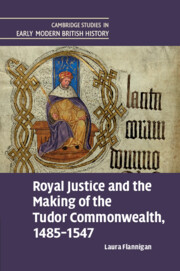Book contents
- Royal Justice and the Making of the Tudor Commonwealth, 1485–1547
- Cambridge Studies in Early Modern British History
- Royal Justice and the Making of the Tudor Commonwealth, 1485–1547
- Copyright page
- Dedication
- Contents
- Figures and Tables
- Acknowledgements
- Note on the Text
- Abbreviations
- Introduction
- Part I The New Justice System
- Part II Seeking and Requesting Justice
- Part III Delivering and Contesting Justice
- Chapter 7 Before the King’s Most Honourable Council
- Chapter 8 Answers and Arguments
- Chapter 9 ‘A Final Peax’: Passing Judgment
- Conclusion Justice and the Tudor Commonwealth
- Appendix Personnel in the Court of Requests, 1493–1547
- Bibliography
- Index
Chapter 8 - Answers and Arguments
from Part III - Delivering and Contesting Justice
Published online by Cambridge University Press: 02 November 2023
- Royal Justice and the Making of the Tudor Commonwealth, 1485–1547
- Cambridge Studies in Early Modern British History
- Royal Justice and the Making of the Tudor Commonwealth, 1485–1547
- Copyright page
- Dedication
- Contents
- Figures and Tables
- Acknowledgements
- Note on the Text
- Abbreviations
- Introduction
- Part I The New Justice System
- Part II Seeking and Requesting Justice
- Part III Delivering and Contesting Justice
- Chapter 7 Before the King’s Most Honourable Council
- Chapter 8 Answers and Arguments
- Chapter 9 ‘A Final Peax’: Passing Judgment
- Conclusion Justice and the Tudor Commonwealth
- Appendix Personnel in the Court of Requests, 1493–1547
- Bibliography
- Index
Summary
Chapter 8 illuminates the intermediary stages of litigation before the early Tudor kings. It takes up the little-studied perspective of defendants in cases heard by the king’s Court of Requests and examines the potential for even this most authoritative kind of justice to be resisted. The chapter begins by studying the testimonies of messengers, recorded in Requests’ order books, for evidence of accused parties evading or rejecting the initial summons into court. It then reconstructs the process by which defendants made formal answers to petitions, and outlines the arguments they raised in their own defence. In line with debates ongoing contemporarily in Parliament and Council, defendants’ answers often contrasted extraordinary royal justice with the due process enshrined in English law. These lines of contestation were crucial to the increasing definition of royal justice under the early Tudor regimes, this chapter argues.
- Type
- Chapter
- Information
- Publisher: Cambridge University PressPrint publication year: 2023

